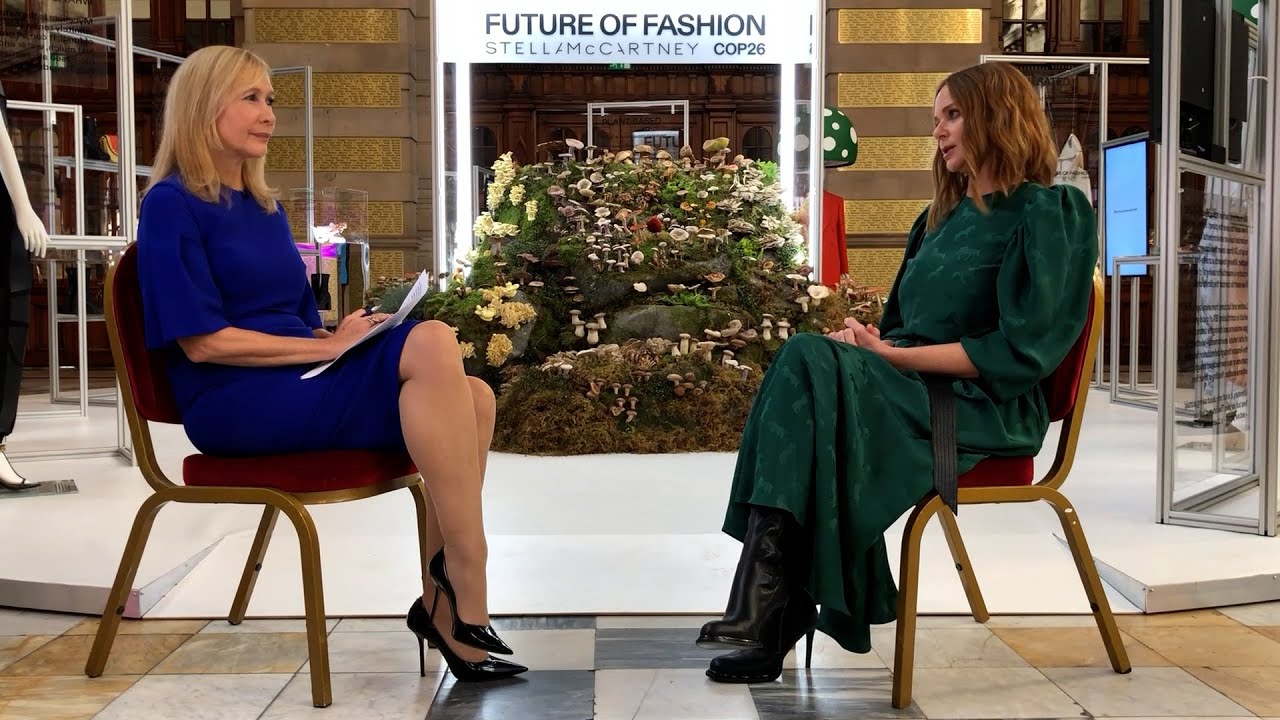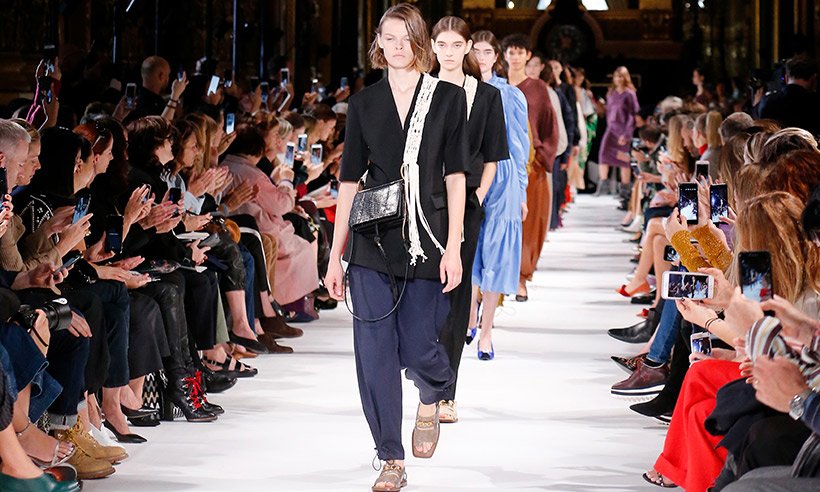British Heritage
Remember, Cherish, Learn.
beta
Stella McCartney - Welfare Fashion
Pioneering Sustainable and Ethical Fashion in British Heritage.
Born to renowned musician Sir Paul McCartney and animal rights activist Linda McCartney, Stella McCartney has carved her own path as one of the most influential and successful fashion designers not only in Britain, but in the global fashion industry.
Stella Nina McCartney was born on 13 September 1971 in London. The birth was a difficult one, leading her father to name his band 'Wings', inspired by his prayers for his daughter to be born 'on the wings of an angel'. McCartney's formative years were spent travelling the globe with her family, but despite their fame, the McCartneys sought a normal life for their children.
McCartney was drawn to fashion from a young age, designing her first jacket at 13. Her interest led her to intern for Christian Lacroix and later work for Edward Sexton, her father's Savile Row tailor. She continued her fashion education at Ravensbourne College of Design and Communication and Central Saint Martins, graduating in 1995 with a memorable show featuring friends and supermodels, Naomi Campbell, Yasmin Le Bon, and Kate Moss.
Following in her parents' footsteps, McCartney is a staunch supporter of animal rights and environmentalism. This belief is deeply embedded in her work, with her brand gaining recognition for its animal welfare ethics. As a lifelong vegetarian, she does not use leather or fur in her designs. Her commitment to ethical fashion extends to innovative animal-free alternatives and promoting her 'no animal' policy through elements of her designs, such as jackets branded 'suitable for sporty vegetarians'.
After a successful tenure as the creative director of Chloé, McCartney launched her eponymous fashion house in 2001 as part of a joint venture with Gucci Group (now Kering). Her collections, known for their delicate feminine cuts, quickly gained international attention and have been worn by celebrities like Madonna and Gwyneth Paltrow. The brand expanded to include perfume, organic skincare, lingerie, and children's collections, further cementing McCartney's place in the industry.
Her influence is not confined to conventional fashion, however. In 2004, McCartney initiated a long-term partnership with Adidas, designing a sports performance collection for women. Later ventures included jewellery inspired by Disney's Alice in Wonderland and a collaboration with Taylor Swift. McCartney's designs were also chosen for Team GB's apparel for the 2012 and 2016 Olympics, marking the first time a leading fashion designer had done so.
McCartney's focus on sustainability and ethics in fashion is not limited to her collections. In 2018, she unveiled a new fashion industry charter for climate action in conjunction with the United Nations, advocating for sustainable business practices. That same year, she took full control of her fashion empire, demonstrating her commitment to her ethical and environmental vision.
Her contributions extend beyond fashion. In 2018, McCartney launched the Stella McCartney Cares Foundation in honour of her mother who succumbed to breast cancer. The charity provides post-operative mastectomy compression bras to women undergoing breast cancer treatment.
McCartney's accomplishments have been widely recognised. Her awards include the VH1/Vogue Designer of the Year award in 2000 and the Officer of the Order of the British Empire (OBE) for services to fashion in 2013. She has also been listed in the Time 100 and recognised as Glamour Woman of the Year.
McCartney married Alasdhair Willis, a British publisher and creative director of the shoewear brand Hunter Boot Ltd., in 2003. They have four children: sons Miller and Beckett, and daughters Bailey and Reiley.
In the wake of her mother's passing, McCartney found solace in transcendental meditation, a practice she credits for helping her navigate the emotional upheaval.
Stella McCartney's contributions to British heritage extend beyond her prolific design career. Through her commitment to sustainable and ethical fashion, she has redefined the relationship between fashion and environmental responsibility. Her brand's refusal to use leather or fur has paved the way for a new generation of designers to follow suit, driving a more humane and sustainable vision for the future of fashion.
Her success as a British designer on the international stage and her commitment to ethical and sustainable fashion practices underline the importance of her legacy. Stella McCartney represents a profound shift in the fashion industry's consciousness, demonstrating that it is possible to marry style, success, and ethics in a world increasingly aware of its environmental footprint.
Early Life and Career Beginnings
Stella Nina McCartney was born on 13 September 1971 in London. The birth was a difficult one, leading her father to name his band 'Wings', inspired by his prayers for his daughter to be born 'on the wings of an angel'. McCartney's formative years were spent travelling the globe with her family, but despite their fame, the McCartneys sought a normal life for their children.
McCartney was drawn to fashion from a young age, designing her first jacket at 13. Her interest led her to intern for Christian Lacroix and later work for Edward Sexton, her father's Savile Row tailor. She continued her fashion education at Ravensbourne College of Design and Communication and Central Saint Martins, graduating in 1995 with a memorable show featuring friends and supermodels, Naomi Campbell, Yasmin Le Bon, and Kate Moss.
A Champion of Ethical Fashion
Following in her parents' footsteps, McCartney is a staunch supporter of animal rights and environmentalism. This belief is deeply embedded in her work, with her brand gaining recognition for its animal welfare ethics. As a lifelong vegetarian, she does not use leather or fur in her designs. Her commitment to ethical fashion extends to innovative animal-free alternatives and promoting her 'no animal' policy through elements of her designs, such as jackets branded 'suitable for sporty vegetarians'.
Ascend to Global Success
After a successful tenure as the creative director of Chloé, McCartney launched her eponymous fashion house in 2001 as part of a joint venture with Gucci Group (now Kering). Her collections, known for their delicate feminine cuts, quickly gained international attention and have been worn by celebrities like Madonna and Gwyneth Paltrow. The brand expanded to include perfume, organic skincare, lingerie, and children's collections, further cementing McCartney's place in the industry.
Her influence is not confined to conventional fashion, however. In 2004, McCartney initiated a long-term partnership with Adidas, designing a sports performance collection for women. Later ventures included jewellery inspired by Disney's Alice in Wonderland and a collaboration with Taylor Swift. McCartney's designs were also chosen for Team GB's apparel for the 2012 and 2016 Olympics, marking the first time a leading fashion designer had done so.
Commitment to Sustainability
McCartney's focus on sustainability and ethics in fashion is not limited to her collections. In 2018, she unveiled a new fashion industry charter for climate action in conjunction with the United Nations, advocating for sustainable business practices. That same year, she took full control of her fashion empire, demonstrating her commitment to her ethical and environmental vision.
Philanthropic Efforts and Recognition
Her contributions extend beyond fashion. In 2018, McCartney launched the Stella McCartney Cares Foundation in honour of her mother who succumbed to breast cancer. The charity provides post-operative mastectomy compression bras to women undergoing breast cancer treatment.
McCartney's accomplishments have been widely recognised. Her awards include the VH1/Vogue Designer of the Year award in 2000 and the Officer of the Order of the British Empire (OBE) for services to fashion in 2013. She has also been listed in the Time 100 and recognised as Glamour Woman of the Year.
Personal Life
McCartney married Alasdhair Willis, a British publisher and creative director of the shoewear brand Hunter Boot Ltd., in 2003. They have four children: sons Miller and Beckett, and daughters Bailey and Reiley.
In the wake of her mother's passing, McCartney found solace in transcendental meditation, a practice she credits for helping her navigate the emotional upheaval.
Stella McCartney's Legacy
Stella McCartney's contributions to British heritage extend beyond her prolific design career. Through her commitment to sustainable and ethical fashion, she has redefined the relationship between fashion and environmental responsibility. Her brand's refusal to use leather or fur has paved the way for a new generation of designers to follow suit, driving a more humane and sustainable vision for the future of fashion.
Her success as a British designer on the international stage and her commitment to ethical and sustainable fashion practices underline the importance of her legacy. Stella McCartney represents a profound shift in the fashion industry's consciousness, demonstrating that it is possible to marry style, success, and ethics in a world increasingly aware of its environmental footprint.
- Stella McCartneyen.wikipedia.org













